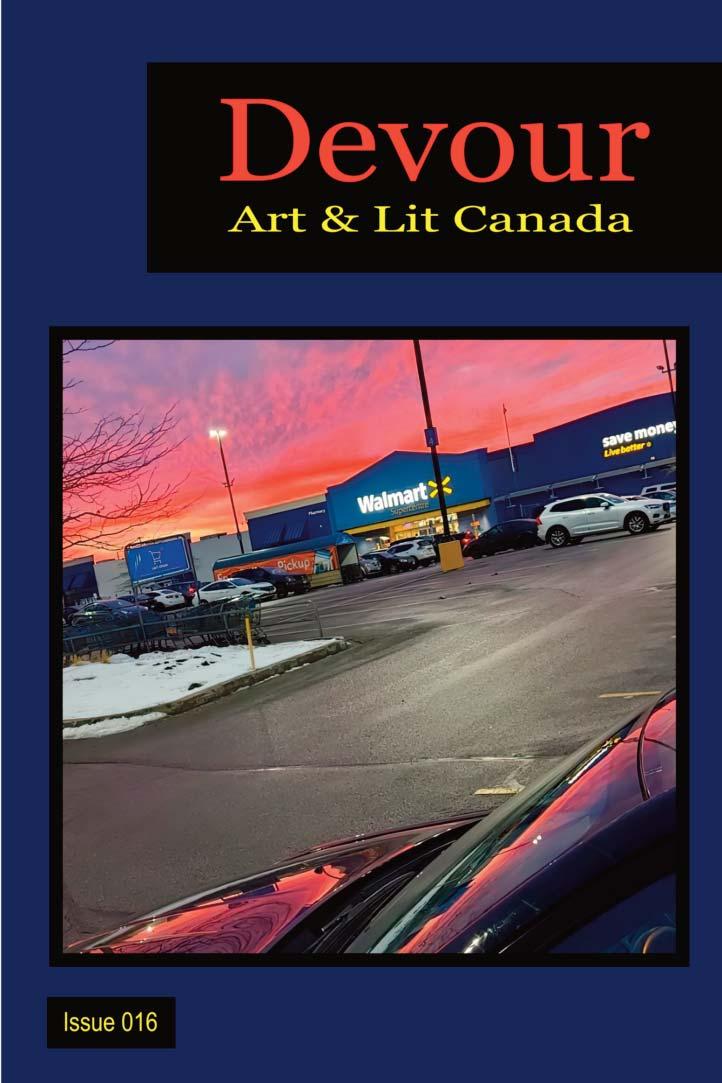



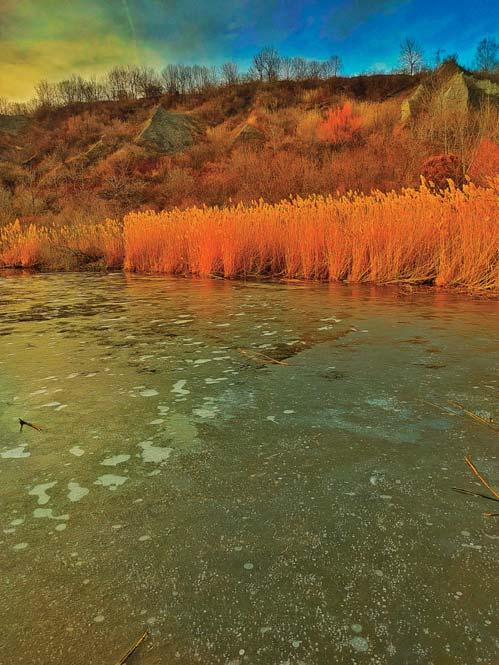
Issue 016 Devour: Art and Lit Canada 2 ISSN 2561-1321 Issue 016 Devour: Art & Lit Canada is dedicated to the Canadian voice. www.WetInkBooks.com
Richard M. Grove
Devour Art & Lit Canada
Find some of Canada’s finest authors, photographers and artists featured in every issue.


Issue 016 Devour: Art and Lit Canada 4
Richard M. Grove
The mission of Devour: Art and Lit Canada
is to promote Canadian culture by bringing world-wide readers some of the best Canadian literature, art and photography.
Devour: Art and Lit Canada
ISSN 2561-1321
Special Issue 016
Spring 2023
5 Greystone Walk Drive
Unit 408
Toronto, Ontario, Canada, M1K 5J5
DevourArtAndLitCanada@gmail.com
Editor-in-Chief – Richard M. Grove
Layout and Design – Richard M. Grove
Front and Back Cover – Richard M. Grove
Welcome to this 16th issue of Devour: Art & Lit Canada.
As usual we are bringing you some of Canada’s most talented writers, poets and photographers.
This special issue is primarily dedicated to the winners of the 2021 and 2022 Don Gutteridge Poetry Award. Congratulations to all of the winners.
Something fun and interesting are the Sunset Over Walmart poems. You will find an explanation for those poems with an intro on page 118.
Feature Photography – Olaf Dijkstra


Issue 016 Devour: Art and Lit Canada 6
Richard M. Grove
Devour Art& Lit Canada
Content
Features:
– Thank you to Photographer, Olaf Dijkstra
Photographs on pages – 8, 9, 10, 11.
– 2022 Don Gutteridge Poetry Award Winners
– John Tyndall – p. 12
– Richard-Yves Sitoski – p. 22
– K.V. Skene – p. 32
– Kate Marshall Flaherty – p. 42
– Bruce Kauffman – p. 52
Don Gutteridge Poems – p. 62
John B. Lee Poems – p. 72
2021 Don Gutteridge Poetry Award Essays
– Essay on Award – p. 82
– Essay on Don Gutteridge – p. 85
– Essay on David Blaikie – p. 92
– Essay on Wendy Maclean – p. 98
– Essay on Antony Di Nardo – p. 104
– Essay on Mike Madill – p. 110
– Sunset Over Walmart – p. 118
– Photographs by Ann Di Nardo – p. 116, 117, 130, 131
–
–
–
Thank you Olaf Dijkstra for your wonderful photographs. Olaf has retiring from being the Photography Curator for the “Canada Coast to Coast to Coast” section. He has moved back to the Netherlands – Canada’s loss is the Netherlands gain. Keep an eye open for more of his photographs in future issues.

We will announce the new Photography Curator of the Canada Coast to Coast to Coast section in the coming Summer issue.

Issue 016 Devour: Art and Lit Canada 8
Spray Lakes in Canmore Olaf Dijkstra

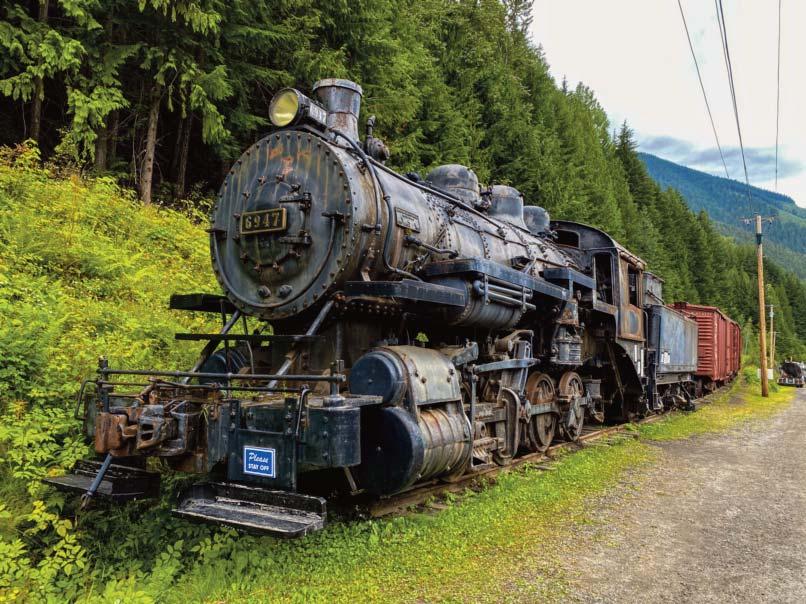


Issue 016 Devour: Art and Lit Canada 9
Old loc in Sandon Olaf Dijkstra
Pothole Ranch in Farwell Canyon Olaf Dijkstra
Eagle parents on nest Olaf



Abandoned chairlift on Crystal Mountain
Olaf Dijkstra
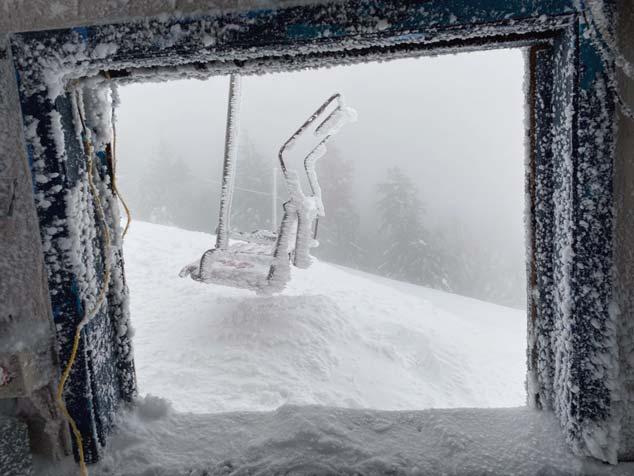
Issue 016 Devour: Art and Lit Canada 10
Dijkstra
Decorated cabin in ghost town of Cody, BC




Issue 016 Devour: Art and Lit Canada 11
Canoe on Moraine Lake Olaf Dijkstra
Olaf Dijkstra
2022 Don Gutteridge Poetry Award


1st Prize
Title: Mangoes from the Seventh Dimension
Author: John Tyndall
ISBN: 978-1-989786-84-0



Publisher: Wet Ink Books
Purchase copies at – www.WetInkBooks.com or Amazon.ca or Amazon.com
Issue 016 Devour: Art and Lit Canada 12
Flinders’ Fingers
Flinders Petrie on Egyptian expedition methodically dug down through layers of potsherds, layers of remote time detailed the fragments recorded their location devised a classification of successive cultures and even where no vessels remained in situ sometimes the contents somehow still lingered with sand much darker at one ancient level where his fingers the first in millennia and in the name of Her Majesty, Queen Victoria grasped and released fragrant sacred perfume for the Scorpion god
Issue 016 Devour: Art and Lit Canada 13
A Tom’s Caution
Don’t you ever dare call me your sweet chocolate chip cat I don’t care what you dreamt what a non-existent review of a non-existent book in a non-existent mag said was your best line yet because if I want a real poem about a real son-of-a-mog I’ll head back overseas to the land of poets I remember from the red adventures of all my sires before me to hell with your nine lives scads of dads in the past we knew this author, Hugh I think was his name and although Esther, the poem’s woman was a fiction that guy could really write about torn ears, sharp teeth the fights and the screams so I don’t give a flying finch about all the exotic timcats who loll about you all day and you’d better believe I could sail to Blighty aboard any ship I choose and when I got there I wouldn’t languish on a gravesite like some dog
Issue 016 Devour: Art and Lit Canada 14
I’d be catching and killing hot and kicking rabbits because while you apes were struggling to quit the homey, leafy canopy my ancestors were kings of the desert night and surviving on blood without a drop of water thus, my precious monkey take heed, for if you ever call me your chocolate chip cat I’ll scratch your eyes out
Issue 016 Devour: Art and Lit Canada 15
Danu
I come to her river on a spring morning mist rising, robin returning when I hear the splash of her horse’s hoofs ’tis Danu, queen of the Celtic gods of the green isle she bends to caress my cheek, saying
Come here
I thee encharm and when she departs an elflock, twisted in my beard, remains
I come to her river at midsummer noon cloud floating, finch circling in the blue heavens and from atop her steed Danu, the mother of all leans to caress my cheek my head, saying
Come here
I thee encharm
Come to me
I thee enchant and when she rides off elflocks, twisted in my beard in my hair, remain
I come to her river on an autumn evening rain falling, blackbird leaving Danu, the great goddess
Issue 016 Devour: Art and Lit Canada 16
dismounts at the river-bank stretches to caress my cheek my head, my spine, saying
Come here
I thee encharm
Come to me
I thee enchant
Come at my call
I thee ensorcell and when she remounts and disappears upriver elflocks, twisted in my beard in my hair, down my back, remain
I come to her river at midnight mid-winter ice cracking, crow sleeping under the silver stars
Danu, mistress of changes strides towards me reaches to caress my cheek my head, my spine my waist, saying
Come here
I thee encharm
Come to me
I thee enchant
Come at my call
I thee ensorcell
Come with me now away
I thee enthrall and when she claims her stallion charger elflocks, twisted in my muzzle my forelock, my mane my tail, remain forevermore
Issue 016 Devour: Art and Lit Canada 17
Pollen Angels
If she could escape, she thought, just for a moment, out of her personal mind into their communally single one, she would know at last what it was like to be an angel.
David Malouf, Remembering Babylon
Out of hexagonal cells sexless sisters fly forth to ensure the ripened fruit of the tree which is in the midst of the garden, yea even of the tree of life
Without these squadrons of soldiering workers you would look unto a land flowing with neither milk nor honey
To you, mirror image of the Hiver of heaven flights of pollen angels wing their way, how many may dance upon you
Be not afraid of their sacred sound their flaming sword east of the sunrise
Be still Let them swarm
Issue 016 Devour: Art and Lit Canada 18
Thou
for whom three identical snowflakes alight upon an upturned face
for whom imaginal dragonflies wrinkle-winged and damp emerge into the air
for whom waterfall run-off roars over rock in foam crescendo
for whom glaciers roll granite debris with abandon for whom ancient ice releases ancient oxygen to ring a drinking-glass
for whom the grape gives up nectar and a beautiful stain
for whom Grass Pink Rose Pogonia and Calypso orchids lure eye-glance
for whom tears well up and slip down from sorrow and joy
for whom the heart drum beats the rhythm of all dance
Issue 016 Devour: Art and Lit Canada 19
To Keep Now Still
Working title of William Golding’s The Scorpion God
The boy-king is dead from fracture and malaria long dead the kings of Egypt all their gold and alabaster will not call them forth again to the Black Land their chipped, eyeless statues feign eternity, a still point that never exists outside a starry life wheeling, flowing, burning leaving Great House behind on display in glass cases we create to keep now forever when every Pharaoh, everyone will become as mummy dust and even the pyramids over time will be levelled and gone
Issue 016 Devour: Art and Lit Canada 20
Tutankhamun’s Mask
The mask that encased the boy-king’s face looms before my face in its museum case as I dare to imagine wearing the relic the mask of the golden breath of dawn carnelian and turquoise coming forth by day azure stone the sky at Nilotic twilight can anyone hear me through burnished gold my lips desert dry, papyrus dry my skin my arms cross with the crook and the flail although I have not conspired with demons the cobra and the vulture upon my brow fail to protect me from the kiss of chaos my blessèd brain through the nostrils gone lungs, liver, intestines, stomach reside in jars priests remove, erect, replace the royal member sacred salts of natron infuse the earthly body the ka strains beneath linen, gold, wood, stone to recognize the visage of father the sun but sees only a reflection in the tempered glass my eyes overlaying the empty gaze of Pharaoh
Issue 016 Devour: Art and Lit Canada 21
2022 Don Gutteridge Poetry Award

2nd Prize
Title: Wait, What?
Author: Richard-Yves Sitoski
ISBN: 978-1-989786-83-3



Publisher: Wet Ink Books
Purchase copies at – www.WetInkBooks.com or Amazon.ca or Amazon.com

Issue 016 Devour: Art and Lit Canada 22
Conception
Does it not make sense that I remember the moment of conception? I was there.
Did I not start off as a slurry, the grey-green of skies before a tornado—
one that tears the roof off without disturbing the china?
Escape
Mother drags me by the collar into playgrounds but I escape. I’m hidden, like writing
on a face-down sheet of paper. What?
Haven’t you kids ever seen a boy who fears erasers?
Issue 016 Devour: Art and Lit Canada 23
God
I draw a space shuttle bound for the station where God lives.
God’s been in orbit so long he’s lost all bone mass.
Look at him, floating there. So small I could put him in a jar.
Father Ignore him? Tonight he’s being a glove lined with fish hooks.
Issue 016 Devour: Art and Lit Canada 24
Uniform
A name tag, an apron, a polyester polo, black pants, and customers who add “just a” before your title.
Work
On a good day work can be enjoyed like eating alone in a restaurant
when stood up on a date.
Issue 016 Devour: Art and Lit Canada 25
Essential
As in most jobs I feel necessary but ignored, like the text on a fire extinguisher.
Dismissal
By the time I got fired I was Ouroboros who had reached the end of his long body and had flipped himself inside out. I didn’t believe the hawk
circling the parking lot, who reassured me I was no more damaged by my job than numbers are by arithmetic.
Issue 016 Devour: Art and Lit Canada 26
Valentine
I meant it when I said that in a firing squad one guy is issued blanks, and if she found herself
against the wall, I hoped that guy was me.
Uh-oh
Of course I’m upset. There’s a radio on in the next apartment, and I can’t stand it
because I know what the announcer will say before he thinks it.
Issue 016 Devour: Art and Lit Canada 27
Bipolar
I ask myself how I can power a lightbulb with my bare hands yet still remain curious about the taste of nightshade berries.
Relief
Smashing things is a matter of life and death. Relief is trapped inside and suffocating.
Sometimes I’m not even mad. I just break plates like Greeks at a wedding when they set free arguments resolved in advance.
Issue 016 Devour: Art and Lit Canada 28
Morning
This morning an Irish setter barked at me and I’m crying again because I’m clearly as ugly as a strip club with the lights on.
Plans
Look! says the day. I have plans for you! The day has plans for us all.
Including June bugs, who come with orders to die on windowsills.
Issue 016 Devour: Art and Lit Canada 29
Allergic
She couldn’t take it any longer. She said that every day we were together was like re-learning the hard way she was allergic to shellfish.
Puzzle
The call informing me of mother’s death comes while I’m doing a word search.
I’m no good at those, or Boggle or Scrabble. I can’t make sense of random letters.
It’s like when you stop chopping carrots to stare at your thumb, not sure what it’s for.
Issue 016 Devour: Art and Lit Canada 30
aiting
In hospital the seasons work in silence. Here is winter, now on night shift, gingerly applying a gauze of snow to a patch of burn-coloured leaves.
Home
Just once, could I come home to an obsequious bellhop waiting to walk my luggage through a voluminous lobby, one with a jubilant chandelier and a fountain of koi that are gentle and forbearing like retired parish priests?
Issue 016 Devour: Art and Lit Canada 31
2022 Don Gutteridge Poetry Award

3rd Prize
Title: Seasonal Adjustments
Author: K.V. Skene
ISBN: 978-1-989786-82-6



Publisher: Wet Ink Books
Purchase copies at – www.WetInkBooks.com or Amazon.ca or Amazon.com
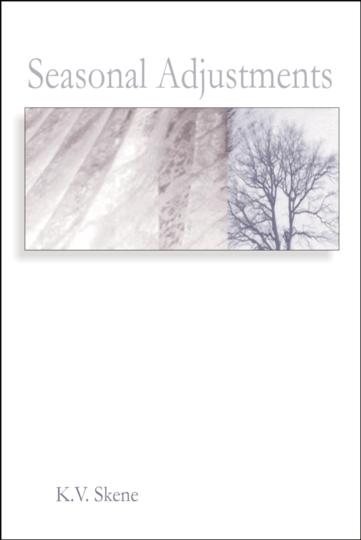
Issue 016 Devour: Art and Lit Canada 32
Forward in Time and Space
the wings of a crow rake the March wind
the following rain its slow awakening
we walk winter grass and mud and feel the earth breaking
wherever we go in darkness or daylight
the bones of history (so old they’ve turned to stone)
lie buried beneath altars rites of passage
from one era to another – from one life
to another (our little minds our complex madness, our sad philosophies)
doubly precious is the child in the womb, the woman
on the bus being carried forward in time and space
only to be overwhelmed by the connections between us
drawn by the season by what we evolved with
the way each heart beats faster in flight
Issue 016 Devour: Art and Lit Canada 33
And Every Year …
i. As spring rains all over you you find yourself water rushing the culvert and you find the river, become river (because it’s home) and all who live along it know its name and yours and all that you did (or did not do) is river, part of the landscape as each day bursts its filmy sky, pain already in the wind and birds are singing and singing hurts (more than silence) more than the danger of burst bank and levee, long wash of spring flood and every year you pray you’ll escape and every year you find yourself water ...
ii. Just another overheated summer and you awake to the alarm of the clock (in imperfect light) and the hills on fire, windburnt sky, grey smoke suspended … admit it’s ridiculous –you’ve hijacked a god who can (and does) cremate a landscape, track black carbon footprints over your heart and you are only one amongst a multitude (neither saint nor sinner) called into a world where even He is not above flouting the protocol.
Issue 016 Devour: Art and Lit Canada 34
iii. Open autumn to empty air and the god-like power of wings, of sky (litmus paper blue) and you (white bird) loving its emptiness –no control, no shadow, no sign pointing anywhere and then it seems impossible to be following this road –every house, every tree, every sidewalk (where you are most at home) shedding daytime heat.
Nothing can come of this (unholy event) you say one day but what you thought could never come has fallen, a ripe apple into your hand.
iv. And you unmap the cold caves of winter
where everything has been born in the dark (yourself and myself) in the hour before dawn and a shiver runs through while the world’s at its coldest –hearts beat rapidly whenever/however we lose (moment by moment) our network of bloodkinship and comrades-in-arms and god-myths, insist the past is a dead-and-buried land yet somehow familiar like fresh snow on a street full of bitter silence that is not beginning (not ending) and even that door slam, small voice helloing, car revving, can’t find its sound.
Issue 016 Devour: Art and Lit Canada 35
A Logical Explanation
gives nothing away, no reason, no rationality but I keep reimaging a phantom half-life,
my once-upon-a-time life – so light-as-air I almost missed it in the awakenings
of early morning coffee and toast and the solitary trek to the first train
and the soft evening’s return home brim-full of skies that spilled
rain upon trees and roofs and empty parks that ran all the way back
to a childish irrationality underestimated in the suburban undergrowth,
an obsolete way of being, a serendipitous long-long-ago
when we were above and beyond happy had total control over the background
music – a logical explanation of our time/ space/belief in nothing
before everything – snakelike swallows itself up and ends nowhere
and everywhere in our city, our home, our room, our wide-open windows …
Issue 016 Devour: Art and Lit Canada 36
This Summer the Rain Told Us
water falls because it must and there is always too much or too little
wrung out of cumulonimbus, raking the eaves of exhausted buildings, leached through drains and gutters
and lakes and ponds choked with grayling perch and trout and roe and reed and the weed-knit bodies of suicides and the murdered
and the accidentally drowned still down among the bottom-feeders and we are afraid
monsoons usually arrive too early or too late
and rivers cannot catch up, no matter how far they come, no matter how long the run-off
at the mouth where tides are predictable and the ocean licks them up as does the moon
whatever it told the rain and this summer the rain told us all the things we never listen to.
Issue 016 Devour: Art and Lit Canada 37
Out of the North Wind
a voice you almost remember –spit-soft vowels, introverted consonants curl the tongue. You taste the strawberry ices of childhood, bite through the city-wired synapses in your brain that blur the murmurs of the multitude and listen closer and closer to the whole human zoo – singing while white skulls rattle and roll around their last days, while bellies ache with unfulfilled potential they drone dank lullabies and lie awake humming the animal that furs their bones and you’re blown back. Before your throat was cut. Back to the first time you opened your mouth, howled at the crumbling moon.
Issue 016 Devour: Art and Lit Canada 38
Over All Things a Whiteness
The fog. The freezing fog. The unknowable No of November, the whiteness that never completely covers up the lies we knead like dough, let rise and shape and bake and share en famille November born and named
one autumnal child at a time fills our house, breathing as we breath, our future crystal clear as that first V flinging itself southwards
and that last desperate yelp of fox rises out of a seasonal crowding of mid-life crises. We have more doubts than grey hairs, more fears than birthdays uncovered in the gelid geometry of bodies slipping from lip and cup in the absence
of a frost moon, low-lying light. Nothing waits upon nothing – now that it’s much too late. Now that it’s November.
Issue 016 Devour: Art and Lit Canada 39
Cold Comfort
the first winter starts with our shoes as mornings focus on toes and fingertips
bite down if we look too long the day will fool us and snow
will fall and paper leaves and pine needles rise over whitened rooftops
frost-rimed foxes scavenge in bins and tender wrens hungrily
berrying the bitter holly take what is theirs
of course, the weather worsens we have known children
not unlike ourselves who fail to follow their footprints
all the way back home but we are quietly confident
January’s old moon pins everything in place
a kiss trapped between two mouths can ripen in fresh fallen snow
and one of us falls backwards grows the wings of an angel
one of us has never been this way before or since
Issue 016 Devour: Art and Lit Canada 40
And for Those who Care for Winter
Frosted windows and your fingernails scratch an initialled heart, a pinhole camera while the slow-going traffic whitens in front of you. A paperweight where February can be buried under a snow moon you have seen in so many cities that you have ceased to wonder if winter comes from clouds or mountain ranges or the roofs of office towers or treetops …
Over a thousand miles from there to here, a blizzard of memories, a drift of regrets, a cold country you’re still fool enough to believe is beautiful.
Spring has an Agenda All its Own
and all the short-sleeved wonder of it is in that handful of blossoms, the few birds we know by name and the gentle greening of the city, warm rain washing the kitchen window, the southwind following clock-forwarding day –that persistent peddler with a backpack of promises we always buy into.
Issue 016 Devour: Art and Lit Canada 41
2022 Don Gutteridge Poetry Award
Honourable Mention
Title: Titch

Author: Kate Marshall Flaherty

ISBN: 978-1-927396-28-5


Publisher: Piquant Press
Purchase copies at – www.piquantpress.ca
Issue 016 Devour: Art and Lit Canada 42
Carib word for dugout, Arawak for slender craft, paddle-propelled, birch-bark or cedar, wooden ribs, seated gunnels slip of narrow boat through liquid, lightweight, fish-shape—
keel-less vessel, we are in water, but not wet—
beneath the bay shimmering shadows dart and gather
a dragonfly alights
our J-strokes smooth, maple-wood paddles shellacked and shiny in summer sun
dip and slide and swing— little droplets in a line—
the rise of rock in the distance, a scraggle of pine on the island
… gulls and clouds dot the sky ...
as we pull and glide in unison, as we pull and glide in silence, the island in our sights
the V-trail from our stern settles, in our wake
http://bit.ly/3GECCmR

Canoe —
Issue 016 Devour: Art and Lit Canada 43
Promise
Feel your fingers along the bark of the old jack pine by the door; half-way up you’ll find a key twisted on a rusty keychain, hanging from a branch.
When you fit the key in the green porch door, open it and to the right will be a switch, under the cowbell.
When you turn on the floodlight, you’ll see the platter of pond, its bulrush edges leaning towards the frog-brown water that smells of clay and catfish.
You can find the wire loop on the post for the chicken wire circling the iced pond. Lift the loop, enter.
Tonight the moon wanes above the trees. If you listen to the snow-still scene, you’ll hear a lone wolf baying at the bright slice.
If you breathe in the March pond air, you’ll taste a tinge of thawing straw, the clue as to where the nest is.
Issue 016 Devour: Art and Lit Canada 44
You know that geese fly south, as do great blue herons, so why this winter nest?
Snap a piece of frozen bulrush and you will see a bit of fluff, sinew stalk, but also glistening moisture— a sign.
You’ve seen the newspapers say the groundhog saw his silhouette, but this, this sap-in-stalk, this nest in soggy snow, the unseen ring around a cuticle moon— Nature is leaving traces.
Issue 016 Devour: Art and Lit Canada 45
The Jack Pine for dancer Meiko Ando
I skitter over hot rocks, curl my city-soft toes to grip smooth sedimentary like the thirsty trees that cling to soil-less striations of history.
As a child I saw Tom Thomson’s art, Jack Pine fierce against a sailor-warning sky, her bent spine leaning into cloud-lines. It made me wonder what she would do if unearthed.
I danced summers on group-of-seven rocks, imagining the wind-reaching Jack Pine, leaping as she might if her roots could let go their talon-grip.
Silhouetted against sunset rose, I became her, uprooted— able to skip across stone, sprinkling cone-buds on the shoreline— lifting my limbs to the wind.
http://bit.ly/3KnRreE

Issue 016 Devour: Art and Lit Canada 46
Rose Quartz
Veins of Canadian Shield cut through sedimentary rock— blushing against storm-cloud grey— streaks of sparkle in a ridge of rock.
The white pines hold their ground; tenacious roots grip coastal crags
as gulls lift their piercing cries above the branch-brooms whisking away cirrus clouds.
Pink quartz, not white as chickadee bib or bulrush pulp,
but a flush in a harsh landscape, a bit of rose in rock’s hard history.
http://bit.ly/3o6yAgK

Issue 016 Devour: Art and Lit Canada 47
salmon—
i am shimmer-skinned, spawning flecks of red, shiny-finned, i flick my gills wide for breath and wriggle side to side in fresh water
i must swim up against smoothed rocks, the current, splashes and curls of small rapids that gush fresh water through me
i am counter-current; push up against downspouts and falls, i fall back, fin on tail, tumble in trying and trying to jump out of my skin-river, up the waterfall pounding me down
dorsal-finned and spine-supple, i can do this— can thrash against the backwards tide
flipped and frantic, i right myself, sparkle in droplets and spray—
crescent-curve, wrestle against water weight to spawn, lay and leave my golden roe—
Issue 016 Devour: Art and Lit Canada 48
Amending For M.F. *
I say, “Let’s go poem people in Union Station –” You are quiet a moment. In the great hall’s echo, you whisper,
“I am a black man. I cannot startle a traveler Not even with a poem.”
I pause, speechless; make the ASL sign for sorry: a soft fist rubbed on the chest.
My fist rubbed on my chest, sore from the long, backwards track of this.
*To poem: to stop a person and offer to read them a poem
Issue 016 Devour: Art and Lit Canada 49
God’s Bits of Wood
She is not the long birch pole Deda carved, not a ticking wheel for measuring steps—
not a “tool thing” at all. walking stick—
she’s a living stem of a bug, a sapling insect,
her hopping busy bark, match-thin
she genuflects, rubs her twig hands together
as if before a feast or sacred ablution—
No wings, nor honeycomb eyes, no beetle gloss nor stinger
This bug is bipedal—she, like me, just wood wisps in the huge forest—
Issue 016 Devour: Art and Lit Canada 50
Vultures
There you are, three bald hags, hunched over and conspiring, high on the wire above me.
You seem peckish today, you flesh-eating dementors, preening and poking black tar-paper wings. Valkyries, stay on the line, don’t descend. My heart burns; I forbid you down-swooping and carrionlust, I deny you access to my stance on this road.
Silent, red-tipped sisters with hangover eyes and wicked kyphosis, I banish you thricely your spin, measure, cut!
I, too, have seared with baldness— puked vomit, my yellow flesh baggy as sackcloth; I’ve picked at bone-splinters, unfurled my bedspread wingspan. I know
you are hungry, lust after rot-flesh and things gone bad— you smell what is nearly dead, and me, I am threading a string of words now, measuring the distance between us—
Issue 016 Devour: Art and Lit Canada 51
2022 Don Gutteridge Poetry Award

Honourable Mention
Title: still arriving
Author: Bruce Kauffman
ISBN: 978-1-989786-81-9



Publisher: Wet Ink Books
Purchase copies at – www.WetInkBooks.com or Amazon.ca or Amazon.com

Issue 016 Devour: Art and Lit Canada 52
unfinished notes from a journal (# 6)
July 2019
there is a melancholy rain outside my window this evening and i realize as i write that i hold an unguided pen in my right hand its ink as fragile as it is indelible
light
in the right light of day and self even wall becomes mirage
Issue 016 Devour: Art and Lit Canada 53
a crossing in a city
as you and i stand downtown at an intersection two main streets crossing cars trucks buses in all their colours pass by swarms of pedestrians in their slow crawl on either side you watch transfixed by it all its flowing colours shapes and voices i look at you smiling embracing it all and want to tell you how foreign all of this is to me but cannot i stand here with but a language you have already forgotten
Issue 016 Devour: Art and Lit Canada 54
autumn
we all in an autumn of our days not simply any autumn instead perhaps that final one we on an earth of soil and stone built our glass cities
and when then for us glass was not enough we made them mirror and became them
Issue 016 Devour: Art and Lit Canada 55
an offering not prayer simpler perhaps a statement request a word of thanks to god or gods energy or universe to a wavering agnostic belief to that spirit of endless time without time
to the known the unknowing the unknowable to softness in a world of too little of it
Issue 016 Devour: Art and Lit Canada 56
epiphany
for this poet this late in life
a reminder that lesser writ those morning and vibrant poems of youth instead now these evening and mourning poems of and to the dead the dying
Issue 016 Devour: Art and Lit Canada 57
another day
billowy clouds loosening narrowing thinning throwing out slender fingers of themselves reaching seeming haphazard but instead prescribed directed attached to a deeper blue sky they stretch their patterns
i watch reading their global messages like tea leaves in a cup
Issue 016 Devour: Art and Lit Canada 58
in a day
in a day it will be over in 24 hours you will be standing or sitting still in this very spot and unbeknownst to you everything you know will have been undone
you will not notice even one in an infinitude of incremental changes in each and every thing
we barely realize surface never fully recognize how absolute is process
and in it all how quickly time moves how slow the evolution
Issue 016 Devour: Art and Lit Canada 59
difference of profound difference asked to sit and when prompted then to either create a poem or allow one opt for the latter and there become not the poet instead the ink the page
Issue 016 Devour: Art and Lit Canada 60
old yellow school bus
perhaps more humility than economy and without a limo’d pretentiousness
an old yellow school bus approaches a sheet of white typing paper taped to the bottom of its front windshield near the door
and hand-printed in bold black ink with letters large enough to be easily seen by anyone even twenty feet away
were simply these words: “MacMillan Wedding Party”
Issue 016 Devour: Art and Lit Canada 61
Poems by Don Gutteridge the Canadian Prince of Poetry.
Tagging Along

For my father in loving memory
My Dad lets me tag along on a cold March morning while he sets his muskrat traps in the wind-whetted shallows of Mitchell’s Bay, placing each baited barb below the water-line, just so (like a card-shark carny beguiling the marks) where the hapless rodents, coming up for air and a bite of breakfast, find themselves to be the bitten, their silken coats agleam in the sunlight that warms their passing, their velvet pelts destined to be draped on milady’s homely shoulders.
Issue 016 Devour: Art and Lit Canada 62
Berry-Bright
For Tom in loving memory
In a long-forgotten drawer I find this full-colour photo of you at a year and a tad, straddling your berrybright Tonka (because your plump unseasoned legs had yet to weave or waddle), but now you can locomote across our cedared deck like a duck on rollers and honk your horn like a gaffed goose to clear the clutter, and in your eyes is all the laughter that fifteen months of loving allows, and the grin you give me is all pluck and beguiling gumption.
Issue 016 Devour: Art and Lit Canada 63
The Gift For Anne in loving memory
The pelvic pouch was meant to keep the foetus firmly in, but doubled as a cradle for my lust that softened it into something akin to love, and in the tender tangling of our bodies and the enthused fusion of our flesh was the world amazed and we viewed it spinning, like an infant’s dreidel, thru the gift of the other’s gaze.
Issue 016 Devour: Art and Lit Canada 64
All Hallows
Point Edward: October 30, 1944
It was Halloween eve, and there we were chanting ahki-lahs and counting cubbadges on our cub-green beanies and bobbing for apples in a buckled tub, and on my way home I was surprised to find myself hobbling, my left ankle pinched stiff, prismed with pain, and by the time I stumbled onto Grandfather’s lawn, my body was alive with something alien and striving, and the first fingerlings of fever blistered on my brow –and it would be one heart-harrowing night of sulfa-suffusions and seven months abed and adrift in my dreams before I found my sea-legs again and danced home on Al Hallows Eve.
Issue 016 Devour: Art and Lit Canada 65
Jinned
O how we loved to run with the wind bevelling our backs, dishevelled in our hair, the girls beside us with their long-legged allure and antic prancing, and if our arms were wings, we would fly like Icarus too close to the sun just to feel the fathoms of our freefalling bodies, our bones afloat in the flotsam of their flesh, and here, where the sky thrives, we are glad to be guests of the gods and like the poets of old, go mad in the windjinned, fancy-fed fury of their making.
Issue 016 Devour: Art and Lit Canada 66
Litmus
What I remember most about the War, besides the empty chair at suppertime where, I was told, my father would someday sit in his blue tunic and buffed brass, or the pink Savings stamps that wouldn’t stick for a nickel or a dime, or gathering milkweed floss to keep a sailor’s jacket jaunty with its feathered flotsam, was my Gran in the downstairs kitchen, all the windows blacked against the everhovering Hun, knitting three-needled Argyle socks for her overseas sons (and an extra pair for a best buddy) to keep their toes from tingling and their hearts cozied, her lips moving, stitch by numbing stitch, as if in penitent prayer or some ancient incantation of mothers everywhere to the gods who suffered their sons to bleed and perish beyond the healing litmus of their love.
Issue 016 Devour: Art and Lit Canada 67
Balm
Every evening when I was a summer shy of seven, before my bed could claim me for sleep, I would slip downstairs to say “sweet dreams” to my Grandpa, and found him, as ever, at ease in his softbottomed rocker, the only light in the room, that which seeped in from the kitchen, where Gran was counting stitches, and the hunched console in the corner with the orange throb in its throat was pouring out the dreadful news of the day, and I wondered if his thoughts were drifting towards the long-ago war he’d weathered or the one on the radio, where his sons now fought –beyond the balm of his loving.
Issue 016 Devour: Art and Lit Canada 68
Strewn Ruins
Point Edward: 1947
When Parson Bell’s manse blew up like Little Pig’s straw abode, scattering lath and plaster and stricken bricks everywhere at once, and we arrived five minutes behind the fire brigade in time to see the dust settle like a dancer’s petticoats, we thought of bomb-bursts on the Somme or the slow explosion of a hand-tossed grenade or perhaps some boulder-buckling ruckus in Hell, and wondered idly whether the match intended for cigarette or cigar was still attached to the man who lit it.
Issue 016 Devour: Art and Lit Canada 69
Toddler Logic
For Tim
Long before you could read a word or tell a Jedi from a gerbil, you could recite the opening spiel from Star Wars, as if you had written it yourself as a favour to George Lucas, and although it was set in a galaxy far far away, there was something in the lightsaber’s slash and moon-dodging rockets and cloak-robed Obi and Buddha-browed Yoda and the ever-devious Darth that appealed to your toddler-logic, while mine was a tepid tour with the likes of Buck Rogers in his space togs, or blondlocked Flash Gordon or Dick Tracy’s flickering wrist or Mandrake flogging magic with a cut of his cape, but boys everywhere, then or now, with their dewy-eyed zeal, will always be dazzled by the glamour of galaxies far enough away to be real.
Issue 016 Devour: Art and Lit Canada 70
The Music of Their Meaning
When I was almost two, words still floated like flotsam about the dizzied drum in my ears, unattached to anything that mattered, but when they did so, their syllables sang of infant selves and home, and I gorged on the music of their meaning, suspecting, even then, that the limit of my lexicon would be infinite, and any rhymes to be forged in the fury of their flexing would poem the world.
Issue 016 Devour: Art and Lit Canada 71
Poems by John B. Lee
the 2022 Don Gutteridge Poetry Award finalist judge.

Stronger in Broken Places
“The world breaks every one and afterward many are strong at the broken places. But those that will not break it kills. It kills the very good and the very gentle and the very brave impartially. If you are none of these you can be sure it will kill you too but there will be no special hurry.”
Er nest Hemingway from A Farewell to Arms (Chapter XXXIV) out there just beyond the edge of ice where the blue beauty of moving water begins to shoulder over the white line is the very place where the boy was lost to the slow shrug of a seventh wave shawling up and shivering over his small body with an undulating drag like wet chain as link by shuddering link the cruel-fingered lake became a last seduction of foam and frozen froth and a shaken jigger of shattered ice sizzling in the deep beyond all reach
Issue 016 Devour: Art and Lit Canada 72
like embers hissing as they die and he was swept away waving as an old horizon might wave in distant shores that receive the dying light of day
and I wonder then are we also stronger in broken places as we are when snapped bones knit
if we ask the threadbare spirit where it’s worn most thin by the big questions we are sometimes used to ask
on the wall at home I have a photograph of a Cuban father standing tall beside his little son their hands both linked in loving their shadows cast dark tracings on the sand as they regard the beauty of the Caribbean Sea and what receives the light in everything lies just beyond their reach
Issue 016 Devour: Art and Lit Canada 73
… the lover’s lament
I want the human heart to be so arrow struck by the whispering of quivers coming home in the flesh that it thickens like a reed fletched pond an Eros of an inbreath exhaled above a sighing bottle mouth and the vowel sound of liquid washing inward into fluted glass like the slip of silk on silk where Cupid hovers like a darning needle dragonfly rising and falling and flitting in fascination with his own and only iridescent green reflection in the dark wet looking glass of a long morning where the sky flies past beneath the sky and the mirror goes deep and deeper still in two directions drowning down and drowning upward like the thought of rain
I want the slight metallic fragrance of the milting film of ovum-coated blue where flesh meets flesh in spring while the peeper frogs
Issue 016 Devour: Art and Lit Canada 74
cry out in singing hallelujahs to the day and the turtles clack their shells like wave-rocked stones as under the fire pit the blind earth breaks its silence where the sowbugs crawl enough of war and the so-called two-sided arguments of a falling out of families and former friends enough of the jaded by life elders grumbling over grievances enough of disappointed expectorations and coughing in the morning after dreaming through the night
Issue 016 Devour: Art and Lit Canada 75
After My Own Heart
what of yesterday’s light or last evening’s darkness with my hand to my own living breast with its resonant breathing like an old trunk full to the latches with grandfather’s clothes
I recall how once I was a young boy riding the high harvest of summer hay under the shadow sweep of low branches coming home from the farm in the village on our way to the farm on the hill and we’d stop to take our ease and slake our thirst with the orange-flavoured ice that wept over the hand in the heat oh sweet confection consumed in the dappled chiaroscuro of green heaven as though the breeze in the leaves were the brush stroke of beauty laving a water-cooled canvas
Issue 016 Devour: Art and Lit Canada 76
it was ever thus then as it is now with these lines that follow after my own heart like the blue-veined flowing of muffler-cap chatter and idleness in the fields of tomorrow to feel both the empty wagon and the full-load pull at the draw bolt tongue of the tractor
what works best is a better illusion of luminous dreaming the one where everyone lives on forever like a dead poet’s sonnet of the ochre palm that leaves its lifeline deep oh deep in the earthen darkness of a close at hand cave
Issue 016 Devour: Art and Lit Canada 77
And for All the Walking Away the day
my uncle Russ declined to turn a gift of earth upon my mother’s ashes
I thought of the white sand cross adrift on sacramental oak what also wets the vicar’s thumb to bless a child that puzzlement you see on an infant brow
I also saw in him as he said to me
“I’d rather remember her as she was” as we who have also felt the ploughman’s grief at the turning under of the living green as though it were nothing but a spade’s worth of sorrow to bury a single season in our wake
and for all the walking away we’ve done since then
Issue 016 Devour: Art and Lit Canada 78
God Bless the Beauty of all Broken Things
God bless the beauty of all broken things lost shambles of an autumn shade where garden asters bloom and cold chrysanthemums remain like threadbare buttons of a tattered coat grandmothering the earth’s closed over loam where winter sets its frost upon a shattering of etiolating crimson veined in rust unhook the stays of summer watch the apple rot where wizening is redolent as wine gone off the cork what’s fruit spoil to the lazy hive the omnobibulous butterflies drink deep surrendering their wings like breath on silk gone still there’s truth in fading truth in fog an energy that dampens light the soul is like a heart’s blush in the flesh let fall the lamp harp and the veil let fall the drifting night the angel of the last leaf lingering in rain the areola wet with milk all wakeful stars await the absent dreamer whispering of this … the way a word once present on the tongue might please both mother and the satiated lamb
Issue 016 Devour: Art and Lit Canada 79
Listening Blue
how like child in prayer this squirrel as by the cupping of hands he is turning each worshipful seed brought to his mouth like the single bead of a broken rosary cracking the shell then dropping the dross in a bountiful tray this being the metaphysical hunger of every spirit this wanting of supplication from the appetite of the animus of the animal soul
and I’m reminded of my friend the poet Roger Bell breaking open and spitting out each salted shell accumulating in his palm like the heaping of ashes as we talked together all those years ago when we were both young to the learning of life
Issue 016 Devour: Art and Lit Canada 80
and I also think of the field full with enfilade of those monkish big-headed flowers that had followed the sun all summer bowing their bent-stalk faces to the earth as though humbled by the divine presence at a time of holy harvest
what begins in the sacred hold of each lifeline that ovum that is us in silent reverence to the flavours of sorrow and the quiet joy it brings to remember the almost listening blue
Issue 016 Devour: Art and Lit Canada 81
Essays on the 2021
Don Gutteridge Poetry Award Winners
by MSc Miguel Ángel Olivé Iglesias
Foreword
Exceptional Canadian poet John B. Lee wrote, “Great literature broadens our knowledge, deepens our understanding, clarifies our emotions, and connects us to the inner wells of the self where deep need is served. In great literature we also find a meaningful connection with our fellow humans.” I have often used this quote in my writings, either academic or literary, to put forth an unquestionable truth, the profound significance and influence of literature in everyone´s life. It endows us with knowledge, allows us to reach an insightful and creative construal and reassessment of our worldview, ignites sundry emotions in us—and creates/fosters human bond, human exchange, which is central to survival and growth, to meaningfulness, aesthetics and ethics.
Reading Canadian literature has become a necessary part of my life. I have been doing that for a few years now, immersing in the rich motifs and contribution writers have offered making their work both proudly Canadian and deservedly universal. I was attracted as well to the pleasurable act of reviewing many of those writers thus paying my personal tribute to CanLit.
A tireless promoter and champion of Canadian literature is publisher, poet, photographer, artist Richard M. Grove, who in collaboration with another iconic poet, Don Gutteridge, generated the Don Gutteridge Award. The year 2022 stands as the inaugural year for the award with Gutteridge as the sole judge.
Issue 016 Devour: Art and Lit Canada 82
Grove asked me to write a few intro words about Don, the Award and the first group of poets to win it. Four authors received the 2022 Don Gutteridge Award. Besides Don´s wise, experienced opinion to select them, it is my modest contention that the names we will be reading in this book have left a permanent mark on Canadian poetry.
But, let´s talk about the judge first (you can read my review on him in the book). Don Gutteridge’s attitude towards life and poetry is evidenced in his poem “Defy”: “Poetry is both bliss and consolation, a way of speaking to the world that subsumes both shy and defy.” Notice how Don considers poetry to be communication, a principle I introduced with Lee´s quotation. Gutteridge understands that poems speak to people, they state something, they grant happiness in the realization of the self, and bring comfort to the poet’s soul, other qualities of writing explained by Lee.
In an interview with Don via email when I was preparing to write my book Five Canadian Poets: Analytical Essays on James Deahl, John B. Lee, Don Gutteridge, Glen Sorestad, A. F. Moritz,(QuodSermo Publishing, 2021), I asked him if he thought he would ever give up writing poetry. His answer was definitive: “Nothing short of a stroke could stop me from writing poetry… I seem to dream poems and wake up writing them... I am very fortunate that the Muse has never let me down.”
Read his piece “Ruthless” to absorb fully the depth of his answer and his indefatigable pursuit of truth as his ultimate goal when he warmly enlinks words in his lines:
And me composing poems: inklings I tease towards some sense in words whetted upon the wheel of memory and swerving askance upon the page where they lean upright, enlinked, ready to be swallowed whole, raw and ruthless in rhythmic pursuit of the truth.
Issue 016 Devour: Art and Lit Canada 83
When we read his work, we find, we sense, all his experiences outlined, elaborated on, colored in the excellent penmanship we enjoy across his oeuvre. This is the judge, the man—the bard, as I have called him. This is the name honoring the Award.
The four winners, whom I will talk about in the book too, are now linked to an important award that will continue to group fine Canadian writers. All four winning books will be published by Wet Ink Books.
First Place: $2,500.00
David Blaikie – A Season in Lowertown.
Second Place: $1,000.00
Wendy Jean MacLean – On Small Wings.
Third Place: $500.00
Antony DiNardo – Through Yonder Window Breaks.
Honourable Mention:
Mike Madill – The Better Part of Some Time
In my book Five Canadian Poets…, I said that those five poets (Don included), “as contemporary Canadian poets of such high standing, are the style that future poets will emulate, they are the model that others will imitate and follow. They are future Al Purdys, future Milton Acorns, future Dorothy Livesays. They are the best fountain to drink from in the inexhaustible Canadian spring.” I am positive that Blaikie, MacLean, DiNardo and Madill can be counted –in fact, by winning the Award they already are on the right path– among those poets who will emulate greats like Deahl, Lee, Gutteridge, Sorestad and Moritz. I toast to that thought.
Issue 016 Devour: Art and Lit Canada 84
Don Gutteridge: The Poet Who Seems to Dream Poems and Wakes Up Writing Them
by MSc Miguel Ángel Olivé Iglesias
An understanding of the significance of Canadian poet Don Gutteridge may start by reading the following: “Literary critics will have much to say about Gutteridge’s uniquely Canadian vision. I am content that his poetry is accessible, unobtrusive, delights the ear, stirs the heart and even enters into the soul. It is the art that mirrors inner life”. These are the words of R. G. Moyles, (The University of Alberta. In The Journal of Canadian Poetry).
The first part tells us of a “unique Canadian vision”. Hallelujah. Gutteridge is par excellence one of those gifted people who grasp with mastery the Canadian concept, maximize it and manifest it in their writings. Read his poem “Dunes at Canatara” about which I said was Purdian in spirit:
It took a million years to sculpt these dunes, grain by grain of wavewashed sand whipped by seasoned winds into voluptuous curves and bevelled runes. It took my pals and me an afternoon to put
Issue 016 Devour: Art and Lit Canada 85
our imprimatur upon the shimmering concavities, our bodies pressing their wry signatures deep deep into the sun-stunned sand, feeling the heat of a hundred centuries oozing through.
The second part of Moyles´s quote tells us of the quality and characteristics of his poetry: “accessible, unobtrusive, delights the ear, stirs the heart and even enters into the soul”. Moyles is pointing out the ease with which readers can enter and walk through Gutteridge´s poetry.
Nothing will stand in the way between them and the poet, no inextricable paths, no obscure rhetoric, no jumbled, superfluous overdoing of the line and the meaning. Beyond that, features that mark great poetry in English – rhythm, which is ear-comforting, power, which is heart-reaching – are revealed by Moyles. Finally, the feature that makes a poet just one more poet or a transcendent one, like him: Gutteridge´s poetry “enters the soul”. Once we read his work, it will unequivocally win our hearts and settle in our innermost niches reserved for great things, those that move the spirit and enlighten us. Enjoy the poems below, where Don sums up his connection with poetry:
Rhymes
In my advancing age let me still be the one wrestling with words to wield the world anew, to send them dancing on some distant dais, sylvan with simile: the page where all my rhymes ring true.
Issue 016 Devour: Art and Lit Canada 86
And me composing poems: inklings I tease towards some sense in words whetted upon the wheel of memory and swerving askance upon the page where they lean upright, enlinked, ready to be swallowed whole, raw and ruthless in rhythmic pursuit of the truth.
But it is Don himself who exposes his own poet´s soul when he said to me in response to a question I asked him: “Nothing short of a stroke could stop me from writing poetry… I seem to dream poems and wake up writing them... I am very fortunate that the Muse has never let me down.” He said that for my book Five Canadian Poets (QuodSermo Publishing, 2021), and proved his deep bond with poetry as I delved into his life and work and wrote The Canadian Poet Who Wrote Himself Whole (QuodSermo Publishing, 2022) in honor to his long-standing career.
Writing about Don, especially the latter book, which was about him, I knew it meant a huge undertaking but a necessary and meaningful one. There is an unobjectionably literary, educational, tasteful, evocative, kindhearted and elegant value in what Don writes. His oeuvre is an invaluable contribution to literature, a treasure in Canadian literary heritage.
I have said before that Don Gutteridge has a singular style, comfortably placed within a latent universality. He is recipient, repository and paradigm at the same time. He is committed to his land, evidenced when we read his poems and notice references to nature, to geographies and seasons, to vast maps of wildlife and wilderness.
In Gutteridge, there is an unavoidable, deeply-ingrained familyfriend-wife leitmotif. About his family poems, Emily-Jane Hills Orford
Ruthless
Issue 016 Devour: Art and Lit Canada 87
said, “Special family connections. The simplicity of treasured family moments...” (Hidden Brook Press release) She added, “I have read a number of Don Gutteridge’s poems over the years and I continue to marvel at his ability to capture the simplest of moments in a capsule and make it grander than life with his poetic observations.” (ibidem).:
Together
In this photo, my mother and father, standing tall on my grandfather’s lawn in their Sunday suits, hold me up high between them for the camera’s loving eye, like a prized doll for all the world to see, their hands tethered to steady me on my maiden shoot, as happy as they will ever be, and I still regret I wasn’t enough to keep them together
I have often stated that “Canadian poets exceed in wording, honoring and recalling facts, events, people, and names.” Don´s poems invariably state whom they were written for. Particularly moving are the ones written to Anne, his wife, and to Tom, his grandson. Even though sadness is present in the cry of the bereaved man, Don finds consolation in beauty and memories. The poet does not complain or lament forever: he sees a form of healing in writing. Imagery pulses and emanates from Don´s poetry; he handles language tools fruitfully, innovatively. An essential component of the poet´s poetry is the link of rhythm and musicality. Both elements are unavoidable for him, as he told me also while I was writing my aforementioned books.
Issue 016 Devour: Art and Lit Canada 88
One stunning example of his love for Anne, his wife, is “Au Revoir”. It is a heart-breaking poem. We see a sophisticated poet in love, deeply in love for his departed wife. Everything reminds him of her. Torn in pain and nostalgia, he weaves scene after scene, image after image, glued to the physicality of her memory. Despite grief, he manages to erect a monumental piece here and in other poems, “elegies for my beloved wife” as he told me once:
I do not empty this house of your presence: you are here in every room we shared breath in, your clothes still hang where they belong in their closets, and every painting that adorns our walls is a reminder of your artist’s eye, and the chesterfield, your bête noir, still bears your imprint, and a novel lies where your fingers last lingered, nor am I made forlorn on entering the space now vacant of the woman I cossetted and cradled with love in its essence, for we are taught that death is not an ending, not goodbye but au revoir: I refuse that platitude, preferring your haunting hover and the remnants of the things you touched with such tenderness.
In all his greatness as a poet and person, Gutteridge is a modest human being. Alongside many other Canadian contemporary writers, Gutteridge has left a mark on what I termed in my book Five Canadian Poets as the Canadian style.
Issue 016 Devour: Art and Lit Canada 89
Gutteridge belongs with those iconic writers who dignify the Canadian literary mosaic, who are a part of, as John B. Lee puts forth, the “Great literature” [that] “broadens our knowledge, deepens our understanding, clarifies our emotions, and connects us to the inner wells of the self where deep need is served. In great literature we also find a meaningful connection with our fellow humans.”
Don Gutteridge´s writings expand our cognition and understanding of the world, shake and set our own emotions free, and activate our nexuses with ourselves and our innermost urges. Moreover, his poetry comes from his connection with human beings and helps us revisit our own, substantially, indelibly, transcendently. As Christian Sia of Readers’ Favorite observed, “These poems are filled with the humanity of the writer and readers can easily relate to the emotions evoked in the lines… ” (Hidden Brook Press release)
If at the beginning of these words I suggested readers to start with Moyles´s quotation, now I include a longer critique by John B. Lee, in reference to one of Don´s books, which condenses Gutteridge´s immeasurable quality as a writer: “I read poem after poem and think it is a masterpiece. There is an abiding sadness, but the sadness of wisdom, of knowing that if we live long enough, we lose loved ones, we keep them in our hearts though they are gone. Long ago I coined the phrase “the presence of absence” to capture in as few words as possible what I felt when I thought of those loved ones I’d lost. We preserve them in poems. We keep them alive in memory and dream. We weep and grieve and lament and celebrate. This book is profound and wise and consoling. I will be reading it again and again because it goes deep. It has the courage of autobiography without the honey trap of the confessional.” (Hidden Brook Press release)
Gutteridge will never cease to write and wonder at the world inside and outside him. He will always be caught up in the mystery that is putting words and sentences together to create something that is, to him, undefinable.
Issue 016 Devour: Art and Lit Canada 90
Unsayable
I’ve spent a lifetime seeking the reason for rhyme in pursuit of the perfect poem where dactyls dance until they make indelible sense in the midst of metrical meaning, where I find my heart stirred by the motive for metaphor in the ept uttering of the unword, the saying of what is, alas, unsayable.
There we go, Don Gutteridge´s poetry is invincible ink and “indelible sense”. I invite everyone to toast to the man, the husband, the family man, the father, the friend, the writer, the symbol, the bard. Let´s close these comments about Don with precisely a poem he titled “Bard”:
I find it hard to imagine a life without the wizardry of words: the nuances of nouns and verbs surging: pinned in the prism of a poem, where rhyme has its reasons and rhythm is what the heart hears in the silence between beats and simile has its seasons, and I was born to pain and poetry, and longed to embrace the arcane business of being a bard.
Issue 016 Devour: Art and Lit Canada 91
Weeping and Dancing with David Blaikie’s A Season In Lowertown
1st Prize, 2021

Winner of the Don Gutteridge Award, poet David Blaikie enters my life with poems riding simultaneously wild, free and gentle in his A Season in Lowertown, a 2022 book of confessionary spirit that exudes history, involvement, search, blood, “sins”, deeds and aspirations nascent and in the making.
His biblical allusions in the Introduction impart an aura of gravitas to what is coming, which readers will feel bound to remember as they start their sojourn along Blaikie´s poetry. Hence, as both reader and reviewer, I felt the urge to pick up his line of thought and state right from the beginning that Blaikie has found in his work “a time to speak” as well.
The poet admits straightforwardly “I wept in Lowertown, I danced there. It exists within me still…” Two sides of the soul, two expressions of what makes us human burst in Blaikie, the weeping and the dancing, in a premonition of what we will be reading and experiencing. It will be a confluence of true-to-life emotions sizzling from cover to cover, inviting us to the act of opening our eyes wide, understanding, acknowledging. Maybe Blaikie thinks of the reader as a confessor; therefore, he opens pages of his life and asks to partake—no matter what.
The book is divided into five sections: Flight, Night, Spirits, Netherworld, Moments and Prologue. Trapped in the impossibility of addressing every single poem, I will only touch upon some of them. The first section includes seven pieces from which I comment “Trumpets” first.
Issue 016 Devour: Art and Lit Canada 92
The poem unfolds in a million burning thoughts that the poet hurries to jot down. You notice the scurrying reminiscences piling up in utterances, which despite their trepidation, despite the assorted ideas and references, do leave in the reader the contours of an impression: the poem as a psychological rundown of what is going on in the poet´s mind, interspersed by personal, historic, literary, social and cultural slices.
Formally speaking, a conspicuous absence of punctuation marks in the poem contributes to represent the swirling trains of uninterrupted thoughts. This characteristic leaves readers breathless if they attempt to follow the lines, and it makes them recognize the “time to break down” pulsing in the poet and his embracing “the grit and grime…, the bars, the taverns, the all-night diners and hotels with creaking beds” he tells us about in his Introduction.
Let´s quote lines that mirror what I have commented:
“… and drank a lot the bottomless drinking of being young // rebellion hissing like a fuse inside the times blowing trumpets in my ears // men about to fly to the moon and put big footprints there I’m not sure I was thinking at all, the minister in his collar so black and white // doubt swirled like dust inside”
The second poem in the section, “Blue,” presents us a more laid back Blaikie, more imbued with close realities, more sober. The poet eases from the turbulence and confusion of “Trumpets” – arguably his weeping part – into an almost idyllic remembrance of a moment that led, in his own words, to a significant status in his life – his dancing part. “Blue” is a poem that brought back sparks of the well-known song “Heaven” by Canadian singer Bryan Adams: “Once in your life you find someone who will turn you all around.” Blaikie words it in his simple, precise, decisive two final lines: “I told myself I’d settle in / and we walked from there into life”.
Issue 016 Devour: Art and Lit Canada 93
“Blue” offers us a poet who knows how to handle poetic language so readers become witnesses of the scenes he recreates. He explodes in figurative forms that strike home:
“… elm trees nodding at an eggshell sky the river sliding away her eyes alight the wind soft in her hair and that white dress which sighed so on her body…”
Blaikie captures the event with uniqueness, using a tender and conclusive hyperbole to limn it, as is seen in line four of the extract below:
“… as I stood there in that quivering air of cars on summer grass family, friends, and god gathered round and heard her recite each word…”
Section two, Night, with ten pieces, continues to chronicle Blaikie´s life and doings. From it, “Lowertown” as opener. This is a flash-on snapshot of the town, taken from the poet´s perception. Imaginably gloomy, redolent and resilient perhaps, the poem – high in metaphorical feats –depicts a mental state intentionally exposed and intensely dissected by the poet.
Let´s contemplate this excerpt where well-knit tropes are evident:
“the clock wrote shadows on the walls of Lowertown pushing the daylight back in those scrawled out chalkboard days…”
Then let´s consider these lines where the poet reveals his thoughts again:
Issue 016 Devour: Art and Lit Canada 94
“… hardly thinking, hardly sleeping waiting for night to fall and set nerves alight with pangs of who knows what just pull down the shades…”
Finally, let´s trace the transition that occurs from the first fragment to the second and to the one below. We are caught in a sequence moving from apparently settling depictions to a sudden change of pace to a critical outburst in the last segment:
“… inject both eyes with neon and make briefcase interlopers disappear with their shiny shoes and business mouths and every suit that ever got worn in the name of politics, god and commerce”
Obviously, this poem revisits and remixes the thematic theses propounded by Blaikie since “Trumpets.”
The section carries on with Blaikie´s journey along his Lowertown season with poems, like “Jail,” as samples of those dark periods he went through. This section is rich in overlaps of weeping and dancing.
Section three, Spirits, features fifteen poems. There is constant reference in Blaikie´s book to a writer of renown, so I directed my attention to the poem entitled “Kerouac.” A romantic hero in the eyes of many young people, Kerouac seems to be a compass for the poet.
The poem particularly tells of Blaikie´s remembrances of Kerouac and contexts where he lived and worked. It is a poet honoring another poet and novelist who marked many people´s lives. There is a reference to Kerouac´s trend-setting novel, On the Road. See the effervescence with which Blaikie wrote about the novel and its significance to him: “On the Road was almost holy…”
Issue 016 Devour: Art and Lit Canada 95
Section five, Moments, has fourteen poems. I was especially touched by “Melancholy.” A blend of skill and emotion, the poem reflects on one of those sensations that make us “weep or dance” depending on circumstances.
The theme has been approached by many writers and poets. Iconic Cuban singer and songwriter, Silvio Rodríguez, wrote about it: “Oh melancholy, silent sweetheart, intimate couple from yesterday; Oh melancholy, joyful lover, your pleasure always captures me, Oh melancholy, Lady of Time, kiss that comes back like the sea, Oh melancholy, Rose of sigh, tell me who can love me…” Blaikie made Rodríguez´s tune resonate in my heart as I read the poem. See what Blaikie feels:
“the thing with melancholy is that it tiptoes in and then ... is there as if it had not been away a mist, a thin gray rain…”
The poet conceptualizes melancholy as an ever-present state, one coming and going like the ebb and flow of sentiments, yet points out that sometimes it is never actually gone and resides deep within: “as if it had not been away…”
There are Kerouac allusions in still another piece, “Of the Mind.” The poem stands as homage recollections beyond the famous Beat Generation novelist. It begins with Lawrence Ferlinghetti, an author Blaikie took the title for this piece from (A Coney Island of the Mind. New Directions Publishing, 1958). It mentions other names stamped on the U.S. literary map such as Allen Ginsberg, Joyce Johnson and William Burroughs. But it also sprinkles names of places and locations. I sensed Purdian airs in this poem.
The last section, Prologue, has three poems. All three are special in their own right, in their own perspectives and motifs. A romantic myself almost since I was born, I quote, full, his “And After That …”
In respectful disagreement with Shakespeare´s belief that “All my best is dressing old words new” (in disagreement because we are quite aware of Shakespeare´s greatness and of Blaikie´s broad range to masterly treat
Issue 016 Devour: Art and Lit Canada 96
and blend theme, language and style as if they were on a painter´s palette), and elated in the thereon discovery that images and tropes can be continually renovated, I was moved by this short piece. Enjoy it:
“it’s said that a man is never the same when a woman has slept in his eyes and painted her scent on the skies of his flesh and swept lesser wisdoms away”
His last poem, “The Bridge,” pensive, yearning, intimate; a closer par excellence, invites us to a recurring theme in every writer, poet and artist. Parting, that “sweet sorrow,” is colored by the poet´s keen frame of mind. In an instant, he plays with sublime metaphors again, captures images and memories re-dimensioning them into genuine symbolic evocations, goes back in time and speaks to his beloved one:
“below the iron bridge // where we stopped and stood so often, and the sun would find you there reach past clouds above the moody dam and pour itself upon you…”
Let´s find endless delight in the lines above, in the whole poem and in the book. Let´s toast to the superb amalgamation of solemnity, cutting naturalness, sheer frankness and sensitivity overflowing them. Let´s “… hold that / like an old Matryoshka doll / and all the rest will be inside” and never hesitate to “weep and dance” with a forthright David Blaikie and his A Season in Lowertown, a rightfully merited Don Gutteridge Award holder.
Issue 016 Devour: Art and Lit Canada 97
Taking Wing on a Million Small Wings with Wendy Jean Maclean´s On Small Wings

2nd Place, 2021
Reading Wendy Jean´s intro to the book, her bio and comments on her work, two ideas fluttered in my head. First of all, a quote from the Bible, “A longing fulfilled is sweet to the soul” (Proverbs 13:19). Wendy has met her calls and her longings have been fulfilled, so her soul must surely feel sweet. I am so glad she has found raison d’être in her life. Her poems are a clear cut reflection of her life and feelings and gift to write. Her inspirational springs flow around and inside her.
Secondly, the “birdful” spirit of the book brought back to me a wellknown Canadian birder, Marvin Orbach, whose poetic work I reviewed in my book In a Fragile Moment. A Landscape of Canadian Poetry (Hidden Brook Press, 2020). Particularly emotive is Wendy´s own description of how it all started and why: “These winged creatures have provided me with insight into the strange migrations of life and death, and the echoes “round the corner”.”
The first poem, “On Small Wings,” is deeply touching. It is a gentle prelude to what we, readers, are about to experience. The poet´s exhortation to do what she asks comes to the reader filled with passion and kindness, with latent evidence that the poet knows what she talks about and wants the reader to partake. It is an invitation we cannot refuse. I want to quote it fully:
Issue 016 Devour: Art and Lit Canada 98
Be gentle with this moment. Feel the brush of its wings as it circles around you. Hold out your hand with seeds of hope. When it comes to you, let it rest. Be still. Hold this wonder.
Be gentle with this moment. It has far to go on small wings
This is a poem to tremble with, to be illuminated by. In writing it, Wendy must have thought of everything: short, simple sentences to allow the reader to breathe them and the message in, metaphors that whisper more than speak out loud, words and images that “flirt and flutter, or hide in the shrubbery with lots of jargon and rhetoric…” (from the author´s intro), which she holds in her privileged hands to sprinkle them onto pages and pages.
The poet´s request to do what she proposes will strike home in every reader, as it did in me. On the book´s back cover, Dr. Mark Sirett says, “During this extraordinary time, one can find greatly needed solace, serenity and hope in the words of Wendy Jean MacLean…”
My favorite line – in a completely favorite poem – is “Hold out your hand with seeds of hope.” Faith, hope and charity echo in it in times of despair, confusion and death. But the author asks to have hope. She asks to fly with it on the “small wings” she spreads for the reader.
Meg Freer said about the book, “Wendy MacLean has written a beautiful tribute to the joy of life…” and Deborah Dunleavy commented: “The spiritual relationship with nature as evident in her poetry inspires the reader to pause and recognize those things which we take for granted: the spring rain, trees, rocks, water, even a spider’s web”.
If my comments made you think the previous poem is a great poem, be ready to feel the same with “Green me”:
Green me in this saturation of spring rain.
Unfold yourself into this day.
Issue 016 Devour: Art and Lit Canada 99
Un-pleat my soul.
Dredge the dreary troughs of ego where judgement lingers leaving calcified clichés on fumbling walls I wish weren’t there
The trees laugh at me surfeited by my vocabulary when all they need is rain to open to splendour on this May morning
As I have said of other fine poets, in Wendy we pick a vibrant environmentalist, a poet whose muses come down with and like blessing rain. In my mother tongue, Spanish, saturation has a semantic hue suggestive of unnecessary excess. However, when you read “Green me in this saturation / of spring rain” there is no trace of excess: you want to tread onto the image, to shower in it or dive into it.
Alongside the environmentalist resonance of the poem, there are airs of a social character that explore the many sides of human nature: “Dredge the dreary troughs of ego / where judgement lingers / leaving calcified clichés on fumbling walls”. Dunleavy points out that “Award-winning poet Wendy Jean MacLean offers the reader a moment to pause, reflect and contemplate on the wonderous fragility of life”.
The thoughtful, profound woman and her sources of love are revealed as well in a powerful piece, “You Are Continents to Me”. The title is embracing and superbly hyperbolic, a notion that is penned along the poem, where Wendy harmonizes “French valleys and rugged shores / seismic thrusts and tectonic shouts / islands that separate delicate biomes” with “a new world / from the porch / a kingdom from the garden swing / a universe of raindrops and tulip bulbs / and the dog sleeping on our bed…” with the heart-warming closing lines “I will show you the paths through the forest / as you teach me the ways of the stars”. All of these realities are masterly, sensitively condensed to tell her husband what she feels, and epigrammatically concluded in the last stanza:
Issue 016 Devour: Art and Lit Canada 100
I am not yours to be conquered you are not mine to be found I will show you the paths through the forest as you teach me the ways of the stars
One of the many blurbs I read about the book states: “Cosmic and intimate, gritty and gentle: from the first moments of creation to the aching losses of dementia, these poems draw from nature’s relentless promises of birth, death and change…” The poem “As I Spend the Night Beside You” speaks of those labyrinths of life and death.
Wendy has worded in sincere, resounding lines what her mother and she went through. An especially graphic start, “Nothing can make this chair comfortable / but I pretend to rest / as I spend the night sitting here / beside you… ” leads to “I find comfort being here / when you waken. / “Am I dying?” you ask. / “Not tonight, Mom.” Notice some sort of peaceful aura created when the poet tells us (her mother) that there is relief in being right there when she wakens. It is a sentiment-baring, bonding instant of filial love.
The context makes the poet remember when it was the other way around, when she was born. The endless cycle of life repeats:
I remember standing beside my babies’ cribs watching them sleep counting their breaths. You did the same when I was newborn resting in a hospital bassinette beside your bed
The poem “To Let the Day End” is a hymn to life. It is an evocation of eternity, compacted in the very first stanza, an evocation of what life was:
You will always be young to those who lost you at your death But earth welcomes your ancient soul and waits, with a blanket of soil for your cradle of bones
Issue 016 Devour: Art and Lit Canada 101
If as readers you have any doubts, move to stanza two:
Your family keep a candle, lit on your grave. In the strong winds the light moves and dances as you moved and danced in those last days.
Dunleavy told us that Wendy “… reminds us that we are all a part of a bigger moment, passing though time.” That moment comes and goes and as it moves from the mists of time so it scurries into them again:
this wind is the same gusty gift of breath and spirit that makes life from death.
The last two lines of the poem give both sides of the perpetual enigma of life:
to let the light flicker to let the day end.
I cannot close my comments on the previous poem without bringing to the readers fragments from a poem that Wendy made me wistfully remember. Being the actual author´s name still in dispute, I quote the website source I took it from: https://en.wikipedia.org/wiki/Do_Not_Stand_at_My_Grave_and_Weep
Readers will instantly realize the commonalty of feeling and sanctity in both poems, the assurance that wafts in them, the profound connection that remains. In Wendy´s piece, it is the survivor who speaks; in the poem I quote from, it is the departed one yet signals of faith and hope remain untouched in both. Enjoy Wendy´s poem, Wendy´s book and these segments from “Do not stand at my grave and weep”:
Issue 016 Devour: Art and Lit Canada 102
Do not stand at my grave and weep, I am not there, I do not sleep.
I am a thousand winds that blow;
I am the diamond glints on the snow.
I am the sunlight on ripened grain;
I am the gentle autumn’s rain.
On Small Wings fills our hearts. I cannot think of more adequate ways to explain the spirituality it is endowed with. Yet beyond and above that inner spirituality fly colossal wings that flit and perch on the soul of every reader. This is a book to cherish and reread every time we are confronted with the riddles of life and death, the brittleness of living and the greatness of reaching out for hope and enlightenment in nature, in the simple things.
Please read On Small Wings. You will take flight into what Sirett referred to as “… the profound beauty and transformative power of nature… Like nature itself, her musical words sing truth with a depth of inner joy, harmony and peace.”
Inner joy, harmony and peace. This is the balance, the healing prayer, the million wings.
Issue 016 Devour: Art and Lit Canada 103
Looking Out Windows with Antony Di Nardo´s Through Yonder Window Breaks
3rd Prize, 2021

I have had the privilege of writing and publishing about some of Antony Di Nardo´s previous books. I read and enjoyed Skylight and Gone/Missng. A poet “always… attracted to nature, as much as to the surreal and the absurd” (his words), Di Nardo invites us once more to his constant experimenting and his unique style to write and play with meanings, words and sentences.
Di Nardo´s take of life and poetry defines him. He clearly states that “a poem should not mean but be.” This is what he does when he embarks on his journey Through Yonder Window Breaks. His poems ARE ergo they breathe and live. And in the poems, the universe – next to him (inside him) or far beyond – pulses and offers rich meanings even when he says they are not supposed to mean.
See these lines from his opening piece, “Bloomsday”:
Every room
Sufficient to furnish a record of where I have and Haven’t been, a window in each with an inside-out And a book I put back on the shelf.
As a reader, I felt the need to step into every room with Di Nardo. Those rooms speak and the poet acknowledges it. Windows seem to have attracted his eyes and set his poet´s mindset in motion. Yet my favorite line is the end line. Di Nardo is an inveterate reader: he puts a
Issue 016 Devour: Art and Lit Canada 104
book back in the shelf in a cycle I am certain he has been repeating for years.
“A Poem That’s More About Me Than Birds”, Di Nardo´s second proposal in the book, brings us the interplay of nature and thought, “I like to watch as much as listen—”. From this initial statement, we travel with the poet and his metaphors (“The banter and bluster of wings painting leaves”), which take us high with the birds and exposes a vibrant, observant poet whose senses absorb what surrounds him.
One of the comments I liked best about the book is the following: “The poems frame reflections, observations, in language that is straightforward and transparent. Images are layered; the syntax playful…” The notion of a playful syntax merged with an overturning of meanings is noticed in:
The tear between two clouds and the sounds I heard Telling me to wait for the geese to re-appear. But they don’t, not the ones I was expecting— I’ve confused the words around my house With the words inside my head.
The reader will notice the change of pace, the change in the train of thought and observation of realities outside the poet to a sudden (visually anticipated by ) introspective realization: words inside the poet´s head.
Further down in the book, we come across “Five Selected Scenes of Winter at the Window”, piece 1. The curiosity detected by a comment I read, “These poems are curious about the natural world and interested in nurturing a relationship with it”, flutters in the brief piece:
No bigger than a foot
The sharp-shinned hawk
Falls into my boot
And pulls out a sock
Gripped in its talons
Two shades of yellow
My sock ablaze, the sky
A shocking glow
Issue 016 Devour: Art and Lit Canada 105
We see the poet who watches: “sharp-shinned hawk / Two shades of yellow / sock ablaze, the sky / a shocking glow” – and no full pause at the end of the poem as if there were a continuity of idea and of the infinite expansion of the glow.
Then I came upon piece 3. Somehow Poe (an example of classical influences Di Nardo refers to?), the icon of sounds, echoed in Di Nardo´s play with words and sounds:
In the beginning birds gave us the words for flitter and flutter, for the flute and flicker of wing tip to wing tip, for the long graceful swoop of a hand, unfettered, ungloved, uncluttered, turning the page
And again we appreciate the nature-man back-and-forth, the transition from an outside depiction to the image of a page being turned. In changing vowel sounds, meanings change too in a cycle of freedom of the poet to use expressive means like resonating onomatopoeia in the combination of flitter-and flutter,-for the flute-and flicker, and repetition of prefixes (un-) and participles (unfettered, ungloved, uncluttered). We read a poet who has control – to do what he wishes with that control! – over language, who takes language and plies it to meet his myriad thoughts and urges.
Flipping through the pages unable to approach every poem, I want to make reference to “Red.” Colors and nature take center stage:
Issue 016 Devour: Art and Lit Canada 106
That colour, that one and only colour, occupies centre stage and takes a bow. That one colour, burning hot as fire up against the curtain drawn tight and white as snow. That one fire, stark and bright as the flag on a white-tailed deer, bounding up and gone beneath the boughs. That leap, sharp as eyes can read the contrast, two colours juxtaposed and real as winter— the true north strong and heading for the trees.
We might think the author is obsessed with colors and vistas yet Di Nardo stands as another worthy heir of the glorious line of poets who are mesmerized by the beauty of what surrounds them. I have said before that “Di Nardo, like most Canadian poets, I can tell, captures the outside sometimes unnoticed world in his poetry.” (Taken from my book In a Fragile Moment. A Landscape of Canadian Poetry. Hidden Brook Press. 2020)
He dedicates the poem to a poet friend, Tai (Richard Marvin Grove), who is also a painter and photographer. Both poets do know what Di Nardo is describing, they have the insight and the sentience to value such scenes and be transfixed in their beauty.
The reader will feel the limitless vastness limned with a poetic brush, and a sense of motion worded in the highly expressive lines “and takes
Issue 016 Devour: Art and Lit Canada 107
a bow. / burning hot as fire bright as the flag / on a white-tailed deer, / bounding up and gone / beneath the boughs / That leap / heading for the trees.” This is a Purdian poem (another classic being honored?), if you will.
Within the nature-oriented poetry we read in Di Nardo, there are pieces that criticize whatever stands in the way between its beauty and the remote possibility of it being affected, destroyed, defiled. “Home on the Range” is a heartfelt example:
Arrows and frigates
Nuclear missiles, F-18s
IEDs and submarines
Bullets and muskets
Daggers and drones
Rifles and pot-shots
Any killing machine—
These are the least
Of my favorite things
When the sky
Is all cloudy and grey
Skilfully using more expressive means, Di Nardo handles repetition and polysyndeton (the use of and in a continuous string of sentences, and hardly any punctuation in the enumeration, which is another expressive means) to make readers shake at the image he builds for them. Therefore, these tools of language become powerful weapons (no pun intended). In the end, the reinforced idea that a sky is not to be “all cloudy and grey” not because of expected rain but because of the warfare airs (“any killing machine”) mentioned in the poem.
I have said about Di Nardo that he is “A poet who lives fully and action-immersed, whose feelings and sensations bubble in and around him, explodes in and explores sentiments we humans cannot avoid… Above all, he embarks on a righteous journey of singing to life.” (Taken from my book A Shower of Warm Light. Reviews and Essays on Canadian Poetry. QuodSermo Publishing. 2021)
Issue 016 Devour: Art and Lit Canada 108
Many senses are brought to the paintings this poet offers. These senses are activated through the endless capacity he has to take words and either forcibly hammer them into images or gently sculpt them. Both process and result will always be good given Di Nardo´s gift to pour out what came to him from the outside world but was firstly treated and molded inside his creative mind.
Allow me to close my words on Di Nardo with a poem we wrote in cooperation. It shows the Di Nardo we have always read in his books, it gives us a committed poet whose dynamic mind takes syntax and structure to the next level and alert eyes capture reality and paint it with outstanding word-brushes:
this image
In collaboration with Antony Di Nardo … the divinity of blue. Richard Grove
cotton shapes an azure mantle, this accord of white and blue:
under infinity antennas sigh and aim at perfect heights
this image holds a pen unfolds a sheet, perpetuates
words
Read then Di Nardo´s book of fine poetry. You will be surprised looking out the window from his words.
Issue 016 Devour: Art and Lit Canada 109
Towards Hope with Mike Madill´s Poetry Book
The Better Part of Some Time
Honourable Mention 2021

“… because there is hope”. Job 11:18. The Holy Bible
2021 Don Gutteridge Poetry Award Winner, Mike Madill, holds our hand with a firm grip and ushers us into his The Better Part of Some Time, a 2022 Wet Ink Books publication. With an impressive opening piece, “Tether”, three sections and fifty-nine poems, Madill is master of theme and readers´ guide along memory lane. Poetry becomes an awesome feat when it successfully limns reality and bleeds motifs no one can avoid relating to. Madill´s writing validates such truth.
“Tether” stands as a formidable overture. The lines (fragments)
Every blink a freeze-frame, tethering befores and afters. An endless rope-ladder flung into the unknown.
Cling to the belief of safety in numbers, like shoaling fish or flocking birds. Keep each other in sight, cherish that tenuous grasp amidst the tidal drift of everything unnamed
Issue 016 Devour: Art and Lit Canada 110
invite—exhort, for the poet knows firsthand what the unknown has in store, what that everything unnamed is. Madill sweats and sheds tears with every single word, every single feeling wrapped in touching remembrances. As Barry Dempster comments: “Madill’s poems are clean and thorough; he writes with a chisel on hard rock, sparks flying madly around the room…”
Steve Madill, Mike´s brother and a novelist, says, “Front and centre is the universal experience of the decline and passing of a parent.” The hefty notion of loss marks the book and marks me, deeply: I lost my father in sad yet unavoidable circumstances and have been writing poems to him ever since. Reading it now, a year after my father passed away, has made me relive moments Madill masterly describes in what Elizabeth Greene deems “A memorable book, impeccably written.”
The poet moves across a turbulence of sundry emotions, strong, profound, caustic, reminiscent, hopeful – necessary and unavoidable, because we are human after all – but we see, and welcome, the understandably harrowing shift from grief and helplessness to the courage he musters to survive.
English professor Dr. Linda Burkhardt puts it this way: “Mike Madill’s debut collection of poetry traverses the experiences and emotions that make us human, fragile, and humane: childhood wonder and joy, uncertainty, self-doubt, loss, love, friendship, grief, and ultimately the unrelenting hope that keeps us all moving forward.”
So, initially we are witness to a poet urged by childhood recollections, haunted by pain, experienced and ingrained in the flesh and the mind, but saved by hope he clings to as we progress through the book. His piece “Personal Effects” (Bedside – 1), for example, is vividly illustrative of the pain (fragments)
Two nurses grimly lift the hem of your blue bed sheet, denying my view of the doctor removing your intubation tube. Then, I see your chapped lips, slightly parted, poised with an unfinished thought... //
Issue 016 Devour: Art and Lit Canada 111
… a corner of your blanket dragged off the bed, draped over your shoulder. This bloody cornea is like a rage you’d never shown before, dashing our final superhero hopes. Without the breathing tube, he might last five minutes, an hour at most. Your chest rises and falls in an almost imperceptible way… //
… Your warm hand, your grip less than I need. The grit of pain held so close for so long… // I stare at your chest, willing it to rise just once more.
Later, his poem “Escape Hatch” gives us a readapting, acknowledging, struggling, nostalgic, transformative and perhaps already accepting man (fragments)
… counting and recounting the sides of my pencil, imagining it drawing a cartoon escape hatch on the board room wall.
And now here I am, wishing I was clean and dry and planted behind a desk again, contorting brain instead of body. Maybe it’s the cat in me wanting in, then wanting out, in and out, waffling between worlds.
Further on in the book, we read his poem “You Are Happy”, which flashes that signature Dempster says Madill´s poetry carries: poems “imbued with an honesty that is often stunning” or Dr. Burkhardt says is ever-present: “Amid the existential struggle, though, there emerges a
Issue 016 Devour: Art and Lit Canada 112
refreshing wit that is often dark but also hopeful. It is a wit that reminds us to laugh at the absurdities of existence…” The poem (full):
Remember when you used to wear a watch? Before you strapped 10,000 steps to your wrist and your pocket started chirping with texts.
Before bark began to peel from the lofty crimson-king centerpiece in your front yard, and rust appeared around your vanity’s drain.
Never mind. Straight back to the dealer –there’s another smudge on your limited edition Lexus and its opalescent finish.
Upgrade your windows before the neighbours notice they’re lowly crank-outs, not double-hung and triple-glazed. Get that cedar mulch absurdly mounded around every honey locust
because Better Homes and Gardens said so. Purchase only artisanal potato chips – twice the price, gluten-free, and everyone will be impressed.
Maybe even you. A persona only fully realized with the walk-in closet you had to wait until you were forty to find and fill. Now picture yourself robbed of all the brand names and prestige:
no more nine-foot ceilings, three-car garage, grand piano, in-ground pool. What’s left? Nothing more than me. Ch-ching.
However mixed we may find the emotions/themes crisscrossing Madill´s book, there remains a bonding aspect to his poems as a solid whole: the acceptance of our human condition, which sees us born, undergo life´s ups and downs (sideway lapses as well), wrinkle into old
Issue 016 Devour: Art and Lit Canada 113
age and eventually depart. In between are all the involvements and mementoes we build or are thrown into—and hope.
Lisa Burkhardt tells us: “With all of the growing pains, life experiences, joys and loss that make us who we are, Madill takes us there with melancholy (‘Alive’), vulnerability (‘Smother’) and humour (‘Ars Poetica’). Enjoy the journey – I know I did.”
Able to fathom, capture and chisel on the hard rock of writing memories as they emerged, grew, registered and affected his life, Madill soldiers on with a style all his own, plying syntax and word like they were Byron’s or Blake’s to deliver this Don Gutteridge Award winner, that at the end of the day looks at hope prompting us, as Dr. Burkhardt states, “to embrace ‘the better part of some time’”, because what makes us go on is honoring what’s lost, resurfacing after having hit rock bottom, enduring, learning, living and hoping.
I have made it almost a habit to include at the end poems of mine related to the themes I review. Wet Ink Books publisher – and generous friend – Richard Grove (Tai) continues to please me by allowing my “whim”. I wrote the piece I finish my review with less than two months before my father died. He didn´t have the chance to read the Spanish version… May it serve as a tribute to him and to Madill´s father. Thank you, Tai. Thank you, Mike.
Issue 016 Devour: Art and Lit Canada 114
Memories
(To my 84-year-old father, for Father´s Day, June 20th, 2021) Honor thy father. Deuteronomy 5:16
It hurts to see your spirit cave in under the burden of Time, unforgiving years collecting on your shoulders like blankets of age, heavily cold, coldly heavy. It was me, long ago, on those shoulders. I remember. I was a merry jockey up there, my rein your thinning hair or your ears, me barefoot with my make-believe spurs prodding your chest so you´d carry me around, so you´d take your fond-of-horses son out to the street to rival coaches. I remember. Now, I carry you. Less jollity, more pain lancing down your legs. I´m far too old, you complain, looking me in the eye as if asking for an explanation. I cringe at the inevitability of tomorrow—or yesterday, when eternity stole Mom away. I remember. Can hardly walk, you mumble. The joyous trots of past days have cantered down to an effortful walker-assisted shuffle trying to beat the distance between your bed and the nearby rocking chair that seems to be, in your mind, a million miles away. You used to bike to and from work. I remember. You used to race fishes in the beach, run athlete-like, carry Mom in your arms… Today, those memories vanish for you but not for me: I was there with you, you guided me, you prompted me, you taught me. I rekindle those stories, retell them to cheer you up. You say Thank you, faintly giving me a smile of gratitude I´ll always remember.
Issue 016 Devour: Art and Lit Canada 115

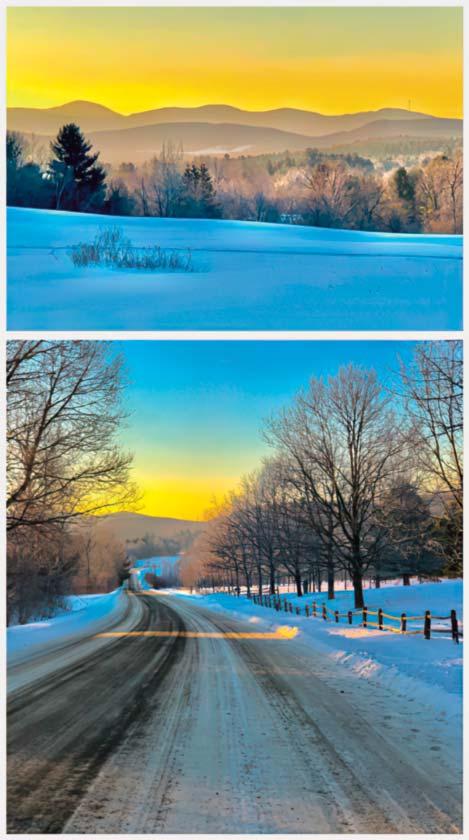
Issue 016 Devour: Art and Lit Canada 116
Ann Di Nardo

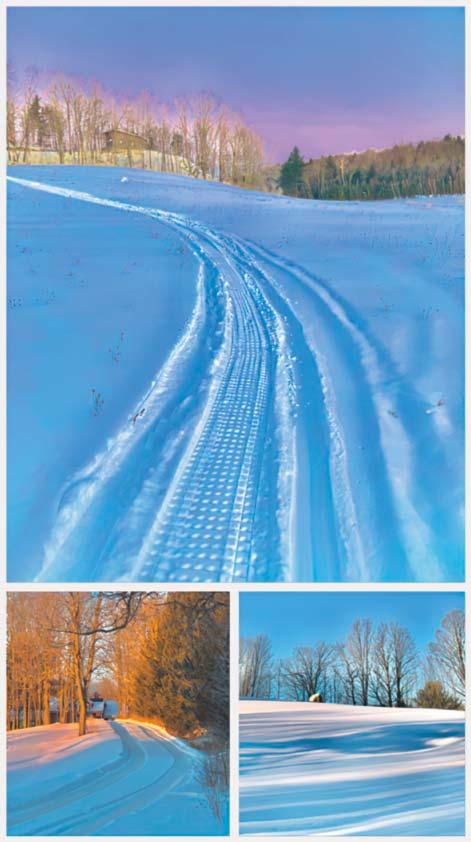
Issue 016 Devour: Art and Lit Canada 117 Ann Di Nardo
Sunset Over Walmart

Dear Devour Readers:
Even if you are not listed with Face Book you can still link to this page. Because this FB post is marked “Public” anyone can link in at: https://www.facebook.com/richard.grove.9678. Take a look at the Sunset Over Walmart poems and post your poem. The posting is a little bit down, at December 28, 2022 - you will see the Walmart sunset pic.
My dear wife Kim and I stopped at the Cobourg Walmart just after Christmass, 2022. The sun was setting. This is the pic I took with my phone. An hour later I wrote this below poem and posted it on FaceBook with the invitation for anyone else to write and post their own Sunset Over Walmart poem.
The following poems are the results. They are not in any particular order other than mostly in the oder that they arrive.
You are invited to post your own poem.
all the best
Richard M. Grove / Tai

Issue 016 Devour: Art and Lit Canada 118
Cover Image by Richard M. Grove Sunset Over Walmart
Richard Grove / Tai Sunset Over Walmart
Does the sun ever set over the neon moon of mass marketing China imports that have become the ubiquitous symbol of need and want? The juxtaposition of insatiable hunger confuses emotional starvation with must-have-needs.
More, more, more, bigger, better, faster, bluer, greener, sexier, sweeter. My body, my mind, my soul all want the sun to never set over Walmart.
Issue 016 Devour: Art and Lit Canada 119
John B. Lee
Sunset Over Walmart
somewhere in the crimson overcast of the heavens of Cobourg blazing over the monochromatic mall called Walmart there dwells an angel wielding a sword of warning forged in the mind of Milton walking the light over the hardpacked Eden of the parking lot as hand in hand he and Dante Alighieri scribing a lovelorn lamentation for the lost sheepfold on the wall above the gate this drab-souled graffito a singular augury for chrome-cart commerce is all that remains of the ancient agora here where little baskets of Peruvian blueberries await the wine-maker’s gaze and good mothers with money enough for a second glance at the dry cellars of ancient Rome look to where the greengrocer fades into the earth like dust in the spade of the tell and someone inquires of a future archeologist “what time is it?” and he answers “now, and then”
Issue 016 Devour: Art and Lit Canada 120
Don Gutteridge
Sunset Over Walmart
Walmart A-Lot
There is something surreal about the Walmart, perched on the late-day pavement, the letters of its calling-card, a bloated alabaster alphabet touting iss timely merchandizing arrival to anyone friendless enough to be caught walking this arid lot for autos and restless pedestrians, but wait, look up and gaze amazed at the sunset sky above the clutter of cars, where a crimson mist is adrift on its own motionless ocean of air, and whatever we do with our brick-and-mortar schemes, there will always be beauty –to startle, and heal.
Issue 016 Devour: Art and Lit Canada 121
Antony Di Nardo
Sunset Over Walmart
Walmart Specials
1 Sunsets, sunrise, dawn or dusk Can be had for pennies less If you park at Walmart and ask For the customer loyalty discount Pack that has you coming back For more and more each time The sky lights up and leaves you Dumbfounded, and in the red
2 Nobody paints the sky quite like Masters of the Universe, Wall Street types who create value By adding zeroes, or the Walmart Neon that drains the sky of colour
3
For one day only—the Sunset Special— Stick around till closing time, Fill your cart up to the brim, And for the low price of your soul
We’ll throw in the moon and the stars. Next week, the Northern Lights!
Issue 016 Devour: Art and Lit Canada 122
Ronda Wicks Eller Sunset Over Walmart
brilliant hues red and pink shades of Canadian funny money $50 bills i wish were in my wallet hunkered down in the sunset over Walmart i would spend those babies frivolously then and there if only i wasn’t standing on the outside looking in and contemplating the sunset heralding an unravelling night the episodic symbolism of a coming cheap seat shopping dream
Issue 016 Devour: Art and Lit Canada 123
Bruce Kauffman sunset over Walmart
it is never this obstacle in the foreground it is earth’s ever-sky behind i am lost in these colours twilight this sunset
these pinks and maroons this lavender burgundy wisps rolling ever changing these colours of dusk i want to lose myself in it
to now jump off the top of this inconvenient building before me
i will leap become air-borne will soar above all else at 1670 kilometres per hour
i will travel joyfully inside this evolving colour forever
i will never return
Issue 016 Devour: Art and Lit Canada 124
Richard-Yves Sitoski Sunset Over Walmart
from the parking lot
the Walmart is a lantern immense and lurid
inside the smell of stripper and wax from last night’s renewals
if an odour could be plangent this would be
vegetables looking wrong too perfect round and red the green an intrusion of summer
sweatshop clothing free from cruelty-free the price for low prices
things will not be different once you are asleep till then you tread the glossy floor with exaggerated caution thinking every step will make a splash you are confounded by the dryness.
Issue 016 Devour: Art and Lit Canada 125
K.V. Skene
Sunset Over Walmart
It is a truth universally acknowledged that sumptuous sunsets over Walmart endanger the brain and overexposure to big-box stores lingers long after you’ve lumbered home overburdened and broke – massive monumentalism, superfluous selectivity plus stupefied sensibilities can lead to fatalities and/or long-term depression/obsession with gigantism. Big is bad for your mental health – but small (believe it or not) is also beautiful.
Issue 016 Devour: Art and Lit Canada 126
Mike Madill
Sunset Over Walmart
The evening’s sky is inflamed above this hangar-sized store, just another link in a teeming
chain of discounted fare and best-you-can-do wares, swollen blue shiner
for a town that never heals. ‘Made in Canada’ simply isn’t in the budget anymore, honey.
Once prices that can’t be beat fail to siphon free all the crimson from another month’s bottom line,
you might finally give in, try on the sloppy vest and nametag, price-match QR codes presented
on trophy wives’ sparkly iPhones, pretend to check the fine print on clipped and wrinkled coupons
offered up by the shaking hands of old dears. Pulling little more than minimum wage behind the till just so you can watch another meal of Pizza-Pop leftovers slowly spin
in the dim light of your microwave, or maybe splurge for a quarter-pounder
with cheese, wondering if you can still afford to get fries with that.
Issue 016 Devour: Art and Lit Canada 127
Shane
Joseph
Sunset Over Walmart
The sun may not set on the Walmart Empire, Like it did on the British, Much to old Churchill’s dismay. I do not shop at the Walmart Empire I don’t dig “more, more, more.” Thus my finances are not in disarray.
Susan Brannigan-Rampp
Sunset Over Walmart
She ditched her AA meeting tonight
Nestling in Johnny Walker’s cocoon
Not even noticing I stayed out all night
Sleeping in the Walmart parking lot
Next to the retirees’ winnebago
In the shopping cart
Return tent
Issue 016 Devour: Art and Lit Canada 128
Wendy Maclean Sunset Over Walmart
alerts the sky. No big specials today, only plastic promises and cheap knocked off dreams. Clouds offer consolation. Beauty can never be bought or sold. Love is always the best special and it is priceless.
Issue 016 Devour: Art and Lit Canada 129


Issue 016 Devour: Art and Lit Canada 130
Ann Di Nardo


Issue 016 Devour: Art and Lit Canada 131
Ann Di Nardo


 Front and back cover by Richard M. Grove
Front and back cover by Richard M. Grove

































































 Front and back cover by Richard M. Grove
Front and back cover by Richard M. Grove


